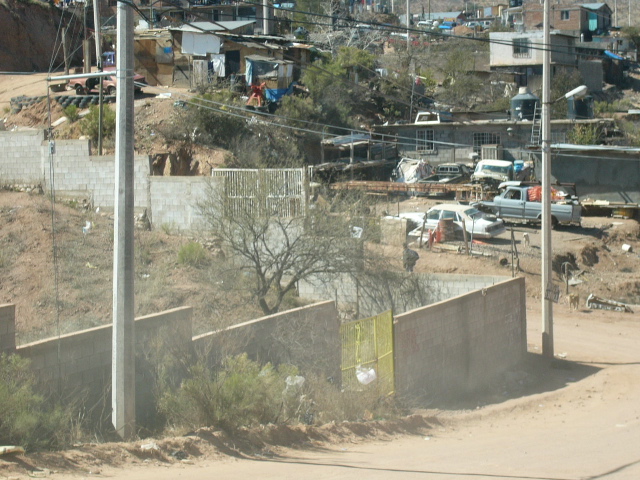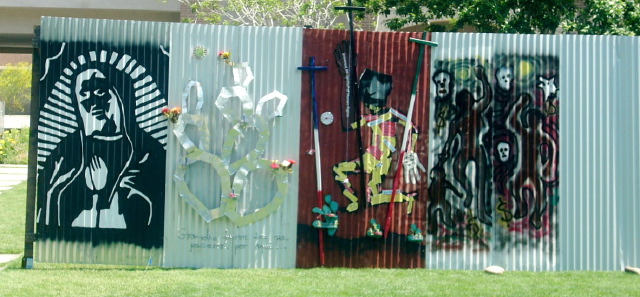
Nogales, Mexico (February 25, 2004)

The experience and insight
I've gained from the trip to Nogales was one that could not be explained through any
textbook or classroom activity. The personal interactions with the different
organizations gave me a glimpse of the varying viewpoints of migration. One
thing is for certain, migration from Mexico to the bordering states of America
can be analyzed on all three levels, macrostructural, intermediate and on a
subject level.
Our first stop took us to Tucson, where we met with a representative of
the Border Action Network. Jenn Allen made reference to the mistreatment by the
border patrol of
undocumented immigrants as well as residents of the Mexico/America bordering
towns. She used concrete examples to confirm the statistics
found in ďJustice on the LineĒ. Her plea for help was definitely felt. Whether
we choose to believe it or not, our dependence on undocumented laborers is
evident. So why is it that they are treated so harshly? I was moved by her
passionate argument for basic human rights for all including the undocumented,
her organization's struggle with our political leaders and getting things done. It was hard
for me to hear of the mistreatment by the border patrol.


I thought it was very effective that our next stop was at the border patrol
station. Of course the view point here was completely skewed from another
perspective. The handsome border patrol officer emphasized their main goal of
protecting our country and serving residents of the bordering towns. Their
statistics of reduced crime and their success in apprehending and deterring
illegal entry supported their purpose mentioned in his opening statement. Of
course the viewpoint was different to that of Jenn Allen, it seemed as if he
created an urgency in protecting our borders. I was somehow disturbed by his
answer to the question asked by a fellow student. She asked if legal entrance to
the United States is so affordable why do migrants continue to enter illegally and risk so much? His
response was, "You tell me?" I guess he wouldnít know. He made it seem logical for
migrants to
take the easier route. But could it be that he was just dancing around the issue,
that entrance to the United States is extremely difficult if not impossible? As
we later learned from Kiko Trujillo in Nogales.
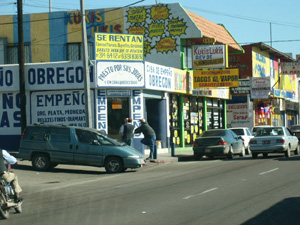
As a citizen of the United States and a product of migration, I am torn on this
issue. I understand that there must be rules and regulations regarding those who
are allowed to come to our country. There must be limitations. I know that the
border patrol is performing their duty in our nationís security. But as a
product of migration and as a human being, I long for equal rights and
opportunities for all. As a nation we are so dependant on cheap immigrant labor, why canít
we allow them basic rights? After all at one point in history, the southwestern
part of the US was part of
their country. I feel that a solution for the issues along the border and
illegal entry can easily be fixed: make legal entry more accessible.
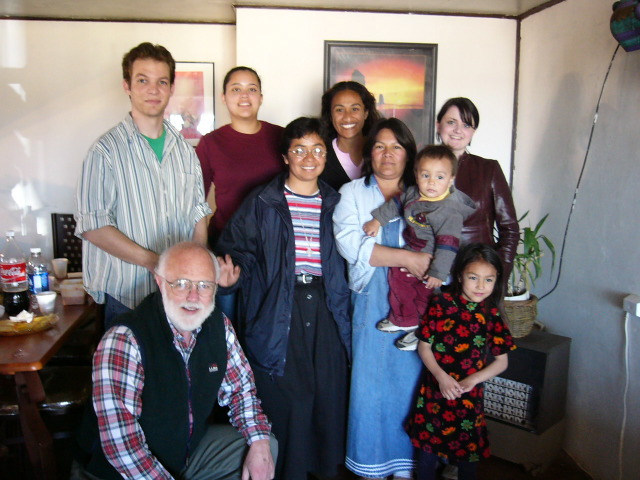
The highlight of the trip was having lunch at Lupitaís home. Yes the food was
exceptionally good, but to see things through her eyes is what I valued most. She didnít feel any
hostility to the Gringos or the border patrol. She was like any mother, trying
to provide for her family. When we had asked Lupita what she wanted her kids to be
when they grow up, she responded, to have moral values. In that I think she
wants her children to be good human beings. They are not rich by any stretch of
the imagination. Their home was poor, but I didnít feel the poverty at all. She was
home with the kids, their children were beautiful, healthy and happy, dad was
away at work and their eldest son was in America attending school. They had
their family, and that was most important to them. This brings up another
motivating force to migrate, not only in hopes of providing better means for
their families, but also the reunification of torn families. I thought back to
the video shown in class, where a mother and child were forced to cross the
border because
of the hardships of living in Mexico but also in order to be with their husband/father.
This tragic experience of their untimely death was not exclusive to her family, but is often the case of
desert crossing.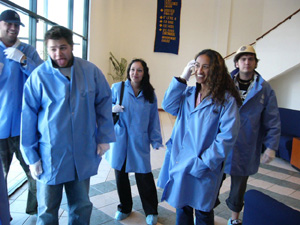
I was pleased to see the working conditions of the Otis maquila. My naÔve self
would hope that this is how it is for all maquilas but I know that Otis is the
exception. I couldnít understand why Mexico did nothing more to help their
country folk. As an outsider, I can see ways that we could help, but if they do
not help themselves I almost wonder if they really understand the benefits that
are associated with improving working conditions. The last speaker was quite insightful.
Kiko Trujillo, Borderlinks director in Mexico, was a prime example of what
Mexicans could do. He overcame the same obstacles that many
Mexicans endure today, through education. After our dinner and his
condensed question and answer session, I mentioned to Kiko the poverty of his
people and how education is a remedy. I proposed that education is the only way they will be
able to lift themselves out of poverty, and he agreed. I asked him then why is
it that education is only mandatory through the sixth grade? Because of poverty, many
parents cannot afford to work and support their families alone, and so require
the full time help of their children. Hopefully soon they will see how important
education is, and how this is the only way out of poverty and only then can they
liberate themselves.
